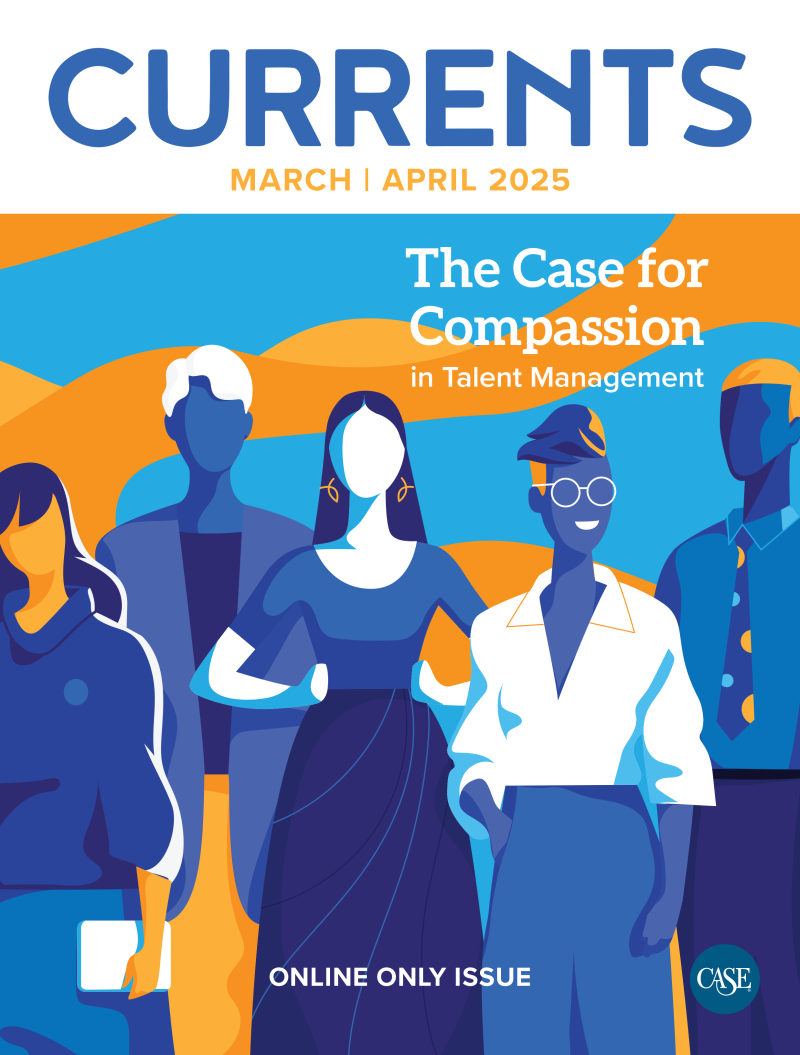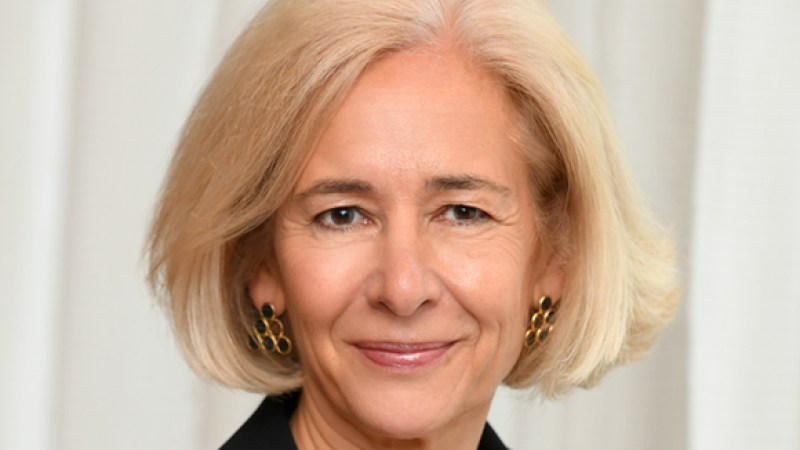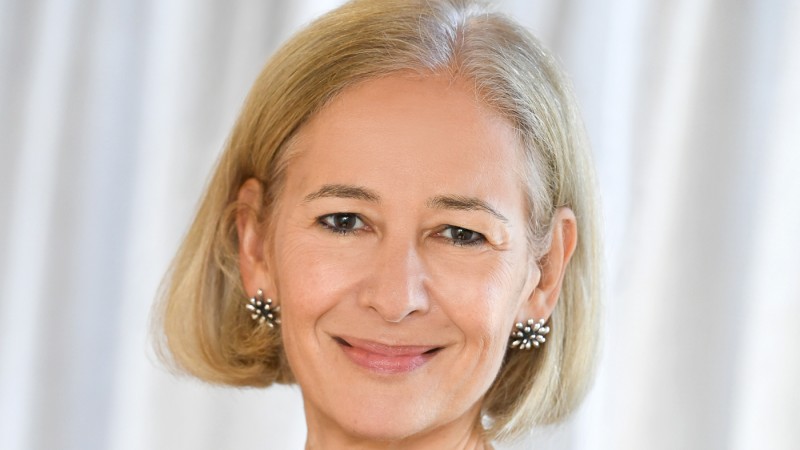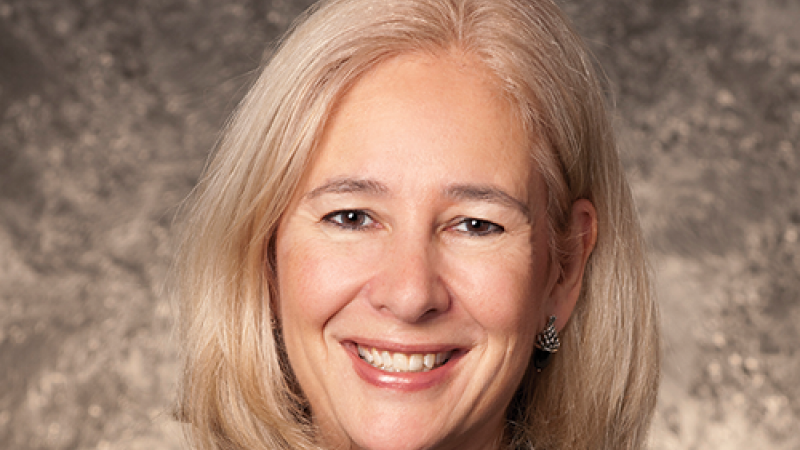
Connecting the Dots Globally
Sue Cunningham became President and CEO of CASE in March 2015. She came to CASE from the University of Melbourne in Australia, where she was Vice-Principal for Advancement. Prior to that she was Director of Development at the University of Oxford, U.K.
During her time in higher education advancement, she was an avid volunteer.
“CASE has been a mainstay throughout my professional life, providing the beacon for my career and community. I have valued immensely the ethos of freely sharing knowledge by all who are working to advance education,” she said about her experience with CASE. “Through CASE, I developed a lifelong network of colleagues and friends and benefited enormously from my volunteer work.”
In a conversation with Currents magazine, she reflects on her 10 years as CASE president, and the joy she finds through in-person connections in all corners of the world.
What were the circumstance that led to your interest in and acceptance of the role of CASE President? Was the position on your radar or something you aspired to?
Interestingly, the last two positions in my career began with CASE programs.
In 2010, I was teaching at the CASE Asia-Pacific Institute in Educational Fundraising in the south of Melbourne at Mount Eliza. Joanna Motion, who at the time was a Vice President International at CASE, sent me a note asking, “If the University of Melbourne was interested in talking to you about a vice principalship, would you be interested in having that conversation?” I looked at the note for five seconds and looked outside at the sun and the palm trees and the parrots and thought, “Sure!” That was October and, after a rigorous recruitment process, the following year, I was accepted for the role, and we made the move from Oxford.
After a few years at Melbourne, I was in Hong Kong as a volunteer at the CASE Asia-Pacific Advancement Conference in 2014. I was sitting next to Jim Harris, who was on the CASE Board of Trustees at the time, at lunch when he said to me, “Sue, the presidency at CASE is opening up. You should consider throwing your hat in the ring.” Of course, I knew that John Lippincott was departing after many years of great service. I thought highly of and cared deeply about CASE, but [leading it was] honestly not something I had thought about. Not the least of which being that every other president at CASE had spent their career serving in the United States.
I was also very happy at Melbourne. I was working with an amazing leader there in [Vice Chancellor] Glyn Davis. We launched a campaign in 2013. I thought I still had a lot I wanted to do there.
So you decided to give it some thought. What went into that process?
There was a whole part of CASE that I knew, primarily the educational program and graduate trainee elements because I had volunteered extensively with those programs. I had also been involved in the building of a region through my governance role with CASE Asia-Pacific. Running an association, however, would be new to me and I considered that there would be a steep learning curve.
Also, I had to consider not getting up every day and walking through a campus and bumping into students and into faculty, not working directly with donors to support those universities. On the other hand, I considered the rewards of serving an entire sector as opposed to one institution. At the time I had an executive coach named Rachel who, as I was considering the transition, suggested I write a list of the things that mattered most to me in a job. I did that and she sent it back to me when I was two years into the presidency at CASE. It was really heartening to see how much of what I hoped for was realized. Said list included: being in an organization with people I enjoy working with and who enjoy working with me; a supportive environment; and somewhere I could make a difference. Being focused in education was key, as was leading a global association, and working with colleagues, volunteers, and members to build a more inclusive, and thereby successful, profession. I wanted to be somewhere where I could lead change. I found all of that and more. Ten years later, I’m glad I took that leap of faith.
What about your personal life? What were the considerations there?
I remember when we made the move from the U.K. to Australia, we felt ready for a change. It felt very good personally for me and my husband Howard. We had been in Oxford for 10 years and my son was about to start university. But that wasn’t the case with the prospect of leaving Australia. We were well into the process of considering a life in Australia. We had secured permanent residency, which was a step on the road to citizenship. Howard was teaching Latin in Australia, as he had done in the U.K. But he had to totally learn a different school system, which he did with aplomb and was loving life in Australia.
On the plus side we would now be a shorter journey to my son, who lives in the U.K. Howard now teaches at a charter school in Washington, D.C., and has adjusted quite brilliantly—as he always does. Both of us will always have a warm spot in our hearts for Australia.
You’ve now lived and worked on three different continents. That must serve you well as the leader of a global organization.
I believe it has; I certainly hope it has. At the same time, I don’t want to overblow my own trumpet. We have members in nearly 80 countries. I’ve lived in three. So there are 77 or so that I have limited or no experience with. I am constantly learning, and I don’t take that responsibility lightly.

CONNECTING INTERNATIONALLY: Bringing colleagues together from different regions is energizing, says CASE President and CEO Sue Cunningham: "There’s a real energy and dynamism and sense of discovery in learning about each other’s contexts." Here, Juan Pablo Murra (left) and Francisco Fernández (right) of Tecnológico de Monterrey in Mexico meet with Cunningham and CASE's Director, Latin America Angélica Careaga (center).
What are some of the accomplishments during your time as CASE President that make you most proud?
I think it’s about people. Anything that has occurred over that last decade is an accomplishment shared with colleagues—members, staff, volunteers and our board. This is my first role being responsible to a board of trustees. At CASE we are incredibly fortunate because our trustees are and have been incredibly supportive and driven and dedicated people from all over the world.
That’s the macro answer. If I’m looking at specific accomplishments, our governance journey in terms of lasting impact is a key measure of success, and it has been integral to us being a global organization. The new structure has helped us become more coherent—both from a volunteer standpoint and organizationally—allowing us to be better focused on how we are supporting members all over the world. It’s a journey still in progress, but we are becoming more impactful as we think about how we are working as a whole, with, of course, nuance that reflects different cultures.
When I see moments where we bring colleagues together from different regions, there’s a real energy and dynamism and sense of discovery in learning about each other’s contexts. I was responding to an email this morning from a member from the University of Adelaide in Australia, who said, “Thanks to your suggestion I’m bringing one of our vice chancellors to the Advanced Development for Deans and Academic leaders in New York [in February 2025].” Imagine that! Someone coming all the way from Australia to a program in New York.
Another way we’ve made great progress in connecting the dots internationally is through the CASE Global Reporting Standards. These standards, which we published in March 2021, update and replace professional standards we had in place for nearly 40 years. At the heart of earlier editions was U.S. IRS legislation, which to be blunt means nothing in Canada or in Chile or in any other part of the world. Now we have a set of standards that, no matter where you are, support you and your institution.
Likewise, we would not have global alumni engagement metrics if not for our change in governance structure and, in particular, our commissions representing members from all regions. The inspiration for these metrics came from a group of British alumni relations professionals who inspired the Alumni Relations Commission and its brilliant leader at the time, Donna Arbide.
There is more to do, certainly. It would be fair to say we are on the journey. But sometimes I look at the little things that were once not even considered, and I can see our progress as a global organization. For instance, 10 years ago, when I was in the process of coming to D.C. to take the job, someone on the team very kindly sent me a mock-up of my business card and the phone number on the card for the head of a global organization was 202-478-5665. I responded saying, “Shouldn’t we have a plus one?” That just wasn’t part of the mindset then. If I wanted to phone a colleague in Singapore it was an international call. Now we have a phone system that means whether I am phoning someone in Singapore or Mexico City, or down the corridor in Washington D.C., it’s all one network. These are all small pieces of the jigsaw puzzle that come together to make us more cohesive from region to region.
What has been the greatest challenge of your presidency?
COVID, COVID, COVID. In an instant, our budget dropped from an anticipated $35 million to $17 million. It was a deeply, deeply difficult period to navigate. And it wasn’t just about business. There was trauma and loss of varying levels for every staff member, every CASE member. Families and lives were impacted.
For CASE, an organization for whom half of revenue came from in-person programs, there was potential for serious consequences, and that weighed on me. It was pretty confronting, mostly on a human basis but also practically on keeping CASE up and running.
How would you describe your leadership style at that time?
There is a great Nelson Mandela quote: “It is better to lead from behind and to put others in front, especially when you celebrate victory when nice things occur. You take the front line when there is danger. Then people will appreciate your leadership.”
I very much believe in all aspects of that sentiment. What was necessary in those nine months of 2020 was stepping to the front, and making some tough decisions, which normally I would have been more consultative about or taken more time with. Our staff responded magnificently. The board and the executive leadership team were incredibly hands-on. We had a task force that met frequently to navigate each step of the journey. As always, even as I adjusted my leadership style, I was still supported by incredible people.
We saw and very quickly understood the implications of what we could and couldn’t do. We were able to move in-person programs online just six weeks after the pandemic started. That’s pretty amazing. We made the cuts fiscally that we needed to and that meant that the first full year of the pandemic we actually balanced the budget. We cut expenses and revenue projections enormously. Ultimately it meant that the continuation of the organization was not threatened because of the tough and quick decisions we made in the first three months of the pandemic.
What brings you the most joy in this role?
Seeing people’s passions and creativity lead to successful outcomes, whether it be at our member institutions or among our CASE staff. I was at the University of California, Davis last autumn, where I was invited to join their campuswide event marking the close of their historic and successful Expect Greater Campaign. It was wonderful to see the excitement and dynamism as they acknowledged their achievements in a way that was both humble and celebratory.
My role as president provides me with this wonderful privilege. I witnessed it so many times throughout our 50th anniversary last year: the nimbleness, the creativity of colleagues around the world, together with members, all bringing something unique to our anniversary.

On why engaging with members in person is so important:
"Simply put, it’s respectful. It matters to me to be in their part of the world learning about them, what they are achieving, understanding their context. How can we be a global organization if the host of the organization doesn’t show up?"
Your interaction with colleagues comes up frequently. At the D.C. office, where you are primarily based, your desk is part of the open-office (no walls) floor plan along with all other employees. Why was that important to you?
As we prepared to move the office to a new building—this was just before the pandemic—we were talking about offices and how much space and how many inches people at different levels should have. I just said, “Why don’t we not have offices?” I had been to a number of universities where presidents don’t have offices, most recently one in Mexico. I thought that was liberating. Now, it would be disingenuous to say that I’m in the same position as everyone else. I have a telephone room behind my desk if I need to take a call or a meeting. But I like being out there and engaged with office happenings. I enjoy it immensely and I like being able to walk around and see people. And have conversations about whatever is going on in their lives. I enjoy doing that in other parts of the world. I also have the privilege of spending time in all of CASE’s offices [In addition to Washington, D.C., CASE has offices in London, Mexico City, and Singapore], and it’s really good to have a chance to connect with people.
The only downside is there is no place to keep my tchotchkes. When I travel, people give me lovely mementos from their institutions. I used to have bookshelves to put them on. But in the greater scheme of things, I think that’s OK.
Why is being an in-person President, which means a good bit of travel, so important to you?
Simply put, it’s respectful. It matters to me to be in their part of the world learning about them, what they are achieving, understanding their context. How can we be a global organization if the host of the organization doesn’t show up? That feels counterintuitive.
A huge part of what makes it possible is the wonderful staff serving the executive office. They put all the building blocks together—they anticipate, plan, and strategize. They are incredibly thoughtful about where I go and why I go.
What’s the best part of CASE travel?
I can’t think of a single place I’ve been to for CASE that there haven’t been aspects of joy. The combination of the people and new places and the food. Always, always the food! I remember one of my funniest moments early on when I was headed to Hong Kong. One of my colleagues on staff knew that I liked iced tea and a tuna wrap. They thoughtfully messaged the person who ran the Asia-Pacific office and said, “While at the conference, if she needs lunch, you should get her a tuna wrap and an iced tea.” When I heard that, I thought, “No, in Hong Kong why would I want to have that? The food is so amazing. I want what they’re having!”
How have the last 10 years changed and/or enriched you?
This has been a huge opportunity to learn and grow and deepen my understanding of both education across the globe and of the world of associations. Working in a single institution, obviously, one builds expertise in that institution and potentially institutions proximate to you. This position at CASE has afforded me a much deeper understanding of different education systems and different institutions in different places. I’m very grateful when colleges, universities, and schools have invited me to their campuses and for the opportunity to meet their president and board members, staff, and academics. It really helps build my understanding of the sector, which helps inform my support of the sector more effectively.
Key Accomplishments
How Sue Cunningham Has Impacted CASE and the Profession
- Deepened global connectivity and volunteer engagement through the 2020 governance restructure, creating one global fiduciary board; Regional Councils for the four CASE regions; and District Cabinets in the U.S./Canada and now in Europe.
- Led the transition for CASE to embrace a global mindset for the profession.
- Developed the digital member experience through online resources and content including the Advancement Resource Catalogue and a portfolio of more than 100 online learning programs.
- Launched CASE Laureates, celebrating the deep tradition of volunteerism.
- Developed the CASE Competencies Model and published the CASE Global Reporting Standards—key to CASE’s strategic intent of defining the competencies and standards for the profession of advancement, and leading and championing their dissemination and application across the world’s educational institutions.
- Acquired the Voluntary Support for Education survey, expanding research through CASE Insights.
- Strengthened CASE’s commitment to inclusion and belonging, including the introduction of the Zero Tolerance Pledge and Statement on Inclusion. Launched the award-winning Advancement Inclusion Index.
- Engaged CASE in two strategic planning processes. The first, which engaged thousands of CASE volunteers, resulted in Reimagining CASE: 2017-2021, and created an ambitious framework for serving CASE’s members and championing education worldwide. Building on the strengths of this plan, led a recalibration exercise resulting in Championing Advancement: CASE 2022-2027.
Getting Personal
Sue Cunningham answers a few rapid-fire questions about what she’s reading and watching, where she’s going, and how she’s getting there.

What She’s Watching
"I just finished a four-part series of culinary travel adventures with Yotam Ottolenghi, a Middle Eastern Israeli chef, who has a restaurant in London and wonderful cookbooks. In fact, I’m trying one of his recipes tomorrow night—chocolate mousse with an orange caramel drizzle."

Best Travel Tip
"Try to remain calm when flights are delayed or cancelled, which is something I need to work on myself! Change your watch to the time zone you are going to as soon as you board the flight so you are already living and breathing that time. Get air and light as soon as you arrive; go for a walk out in the sunshine, or rain! And packing cubes are most helpful. I’m in awe of people who travel just with carry-on luggage. My limit for carry-on is a five-day trip."

Away From the Job
"When I am not working, I enjoy spending time with family and friends, cooking, eating, going to the theatre, reading, and discovering new places… although there is never enough time!"

Favorite City
"That’s a hard one. I was recently in Paris. It was beautiful, just beautiful. In the U.S., I would pick San Francisco. And Melbourne, and London, and Oxford… I am having trouble choosing!"

What She’s Reading
"Two Roads Home: Hitler, Stalin, Mum, and Dad by Daniel Finkelstein. It was recommended to me by Sir Anthony Finkelstein, who is President of City St George’s, University of London, U.K. The book is about his family history. I just finished Wifedom by Anna Funder, an alumna of Melbourne who I got to know when I was there. It’s all about Goerge Orwell’s first wife, who died young, and the influence she had on him including having written a poem before they met called 1984."

What She’s Watching
"I just finished a four-part series of culinary travel adventures with Yotam Ottolenghi, a Middle Eastern Israeli chef, who has a restaurant in London and wonderful cookbooks. In fact, I’m trying one of his recipes tomorrow night—chocolate mousse with an orange caramel drizzle."

Best Travel Tip
"Try to remain calm when flights are delayed or cancelled, which is something I need to work on myself! Change your watch to the time zone you are going to as soon as you board the flight so you are already living and breathing that time. Get air and light as soon as you arrive; go for a walk out in the sunshine, or rain! And packing cubes are most helpful. I’m in awe of people who travel just with carry-on luggage. My limit for carry-on is a five-day trip."

Away From the Job
"When I am not working, I enjoy spending time with family and friends, cooking, eating, going to the theatre, reading, and discovering new places… although there is never enough time!"

Favorite City
"That’s a hard one. I was recently in Paris. It was beautiful, just beautiful. In the U.S., I would pick San Francisco. And Melbourne, and London, and Oxford… I am having trouble choosing!"

What She’s Reading
"Two Roads Home: Hitler, Stalin, Mum, and Dad by Daniel Finkelstein. It was recommended to me by Sir Anthony Finkelstein, who is President of City St George’s, University of London, U.K. The book is about his family history. I just finished Wifedom by Anna Funder, an alumna of Melbourne who I got to know when I was there. It’s all about Goerge Orwell’s first wife, who died young, and the influence she had on him including having written a poem before they met called 1984."

What She’s Watching
"I just finished a four-part series of culinary travel adventures with Yotam Ottolenghi, a Middle Eastern Israeli chef, who has a restaurant in London and wonderful cookbooks. In fact, I’m trying one of his recipes tomorrow night—chocolate mousse with an orange caramel drizzle."
About Sue Cunningham
Sue Cunningham is CASE’s 10th and second longest-serving president. Her immediate predecessor John Lippincott served 11 years from 2004 to 2015. Prior to her appointment as CASE President and CEO in 2015, she served as Vice-Principal for Advancement at the University of Melbourne where she led the Believe campaign, which surpassed its original $500 million goal. Before that, she was Director of Development for the University of Oxford, where she led the development team through the first phase of the largest fundraising campaign outside of the United States (at the time), Oxford Thinking, with a goal of £1.25 billion. She served as Director of Development at Christ Church, Oxford, and as Director of External Relations at St. Andrews University.
Before working in education, Cunningham enjoyed a career in theatre, the arts and the cultural sector. She is an Honorary Fellow of the Melbourne Graduate School of Education and a fellow of the Royal Society of Arts. In 2012, she received the CASE Europe Distinguished Service Award, and the CASE Crystal Apple Award for Excellence in Teaching.
Cunningham serves as a Trustee for the University of San Diego, chairs their Student Affairs Committee, and is a member of the Executive Committee of the Board. She is a member of the Signature Theatre (Arlington, Virginia) Board of Directors, chairs their Governance Committee, and sits on the Executive Committee. She is a member of the Washington Higher Education Secretariat steering committee and the International Association of University Presidents Executive Committee. She is the author of Global Exchange: Dialogues to Advance Education.
Cunningham has a master’s degree from the University of Oxford, a bachelor’s degree in performing arts from Middlesex University, and is a graduate of the Columbia University Senior Executive Program.
About the author(s)
Ellen N. Woods is Writer/Editor at CASE.
Tags
Article appears in:

March - April 2025
DIGITAL-ONLY ISSUE—Why compassion matters more than ever in talent management.
Plus what universities and schools can learn from one another, how one school rebooted annual giving, neurodiversity in advancement, and more.










